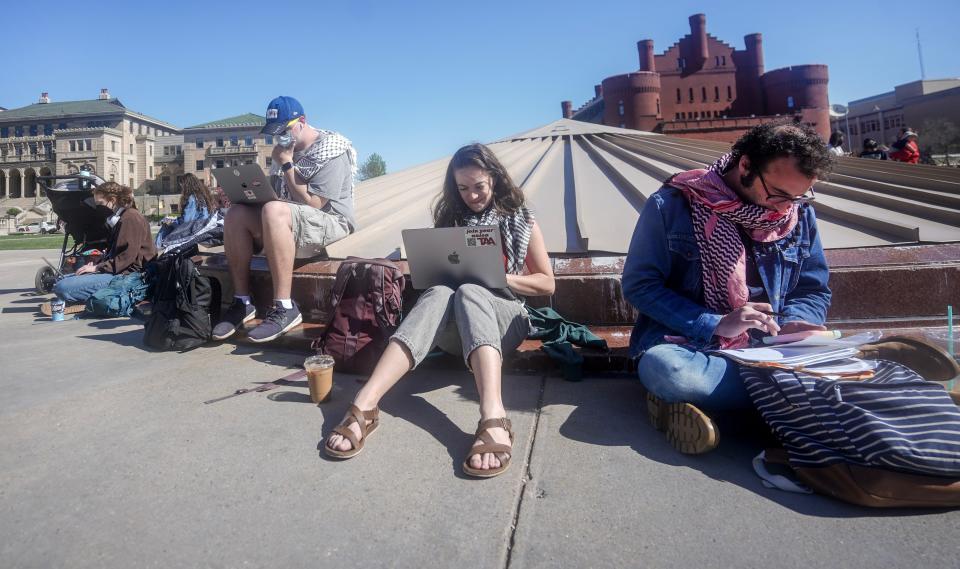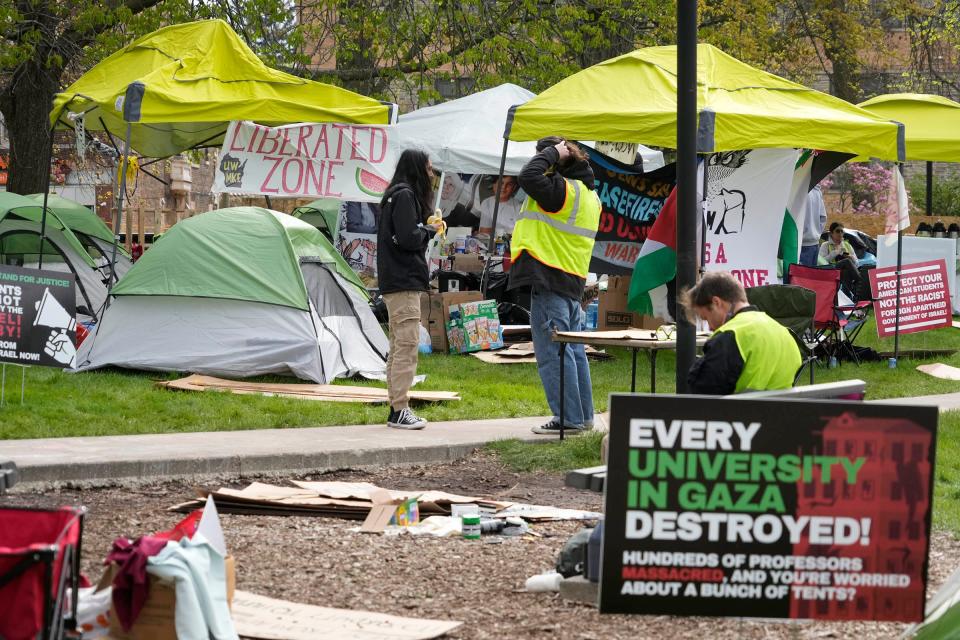First day of pro-Palestinian protests passed without conflict. What's next for UW-Milwaukee, UW-Madison?
A standoff between student protesters and college administrators over tents on Wisconsin campuses continued for a second day, mirroring a national conflict that is growing increasingly confrontational.
In the first 24 hours of the encampments set up at the University of Wisconsin-Madison and UW-Milwaukee, hundreds of protesters peacefully demonstrated against the Israel-Hamas war. Police had a limited presence and made no arrests.
How this ends is unclear.
Pro-Palestinian demonstrators vowed to remain for as long as it takes until their schools meet their demands to divest from companies tied to Israel. UW-Madison Chancellor Jennifer Mnookin said she isn’t negotiating until the tents come down while UW-Milwaukee said it couldn’t meet the demands.
“We are obviously afraid, but our fear of being shot at or being arrested is not bigger than our fear of not doing anything for our Palestinian siblings,” said Samia Saeed, a UW-Milwaukee junior involved in the Students for a Democratic Society.
Tents established at UW-Madison, UW-Milwaukee
Hundreds of students, campus employees and community members gathered Monday morning on both campuses to rally.
At UW-Madison, protesters circled around more than a dozen tents set up on Library Mall. Arms linked in solidarity, they clapped and yelled “Disclose! Divest! We will not stop! We will not rest!”

At UW-Milwaukee, protesters gathered outside the Golda Meir Library, then marched around the block to the corner of East Kenwood Boulevard and North Downer Avenue. Outside Mitchell Hall, they set up about two dozen tents, a number that would grow throughout the day.
Protest leaders at both schools discouraged demonstrators from speaking with reporters and instructed them not to engage with police.
"We have been able to build open communication channels with the administration in the last five months," said UW-Madison professor Samer Alatout, one of several faculty mediating between administrators and students. "We're hoping we can build on those communication channels in order to avoid what's happening in other campuses (nationally)."
Camping is not allowed on university property under state code. But Alatout pointed out the rule carves out a way for the chancellor to make an exception.
"Sure, the rule should be followed, but we hope the chancellor understands that she could also open it up," he said.
Asked why protesters decided to set up tents despite UW-Madison warning days before the rally that doing so was unlawful, UW-Madison graduate student Dahlia Saba said the university’s fixation on tents was "shameful."
"In the face of a genocide that has killed tens of thousands of people ... the university is more concerned with having tents on a lawn than with ending funding for that violence," she said. "So we are out here today to show that we will not be intimidated by the university using these threats."
Wisconsin student protesters make demands, schools respond
The protests that began Monday put UW-Madison and UW-Milwaukee in a difficult position. University leaders are balancing students’ right to protest with a desire to minimize disruptions to their campuses and enforce a state rule banning encampments.
Republican lawmakers pressed the schools to take swift action and argued the protesters’ behavior was disgraceful and antisemitic.

UWM protesters listed four demands:
Disclose the university foundation’s financial assets and “divest accordingly.” The school said its foundation can’t divest from specific companies in its mutual fund investments.
Cut ties with weapons manufacturers and commit to no future deals with any organization that “profits from or supports the occupation of Palestine.” The school said it does not have investments in weapons manufacturers.
End study abroad trips to Israel and research partnerships with institutions in Israel. The school said it does not have any active study-abroad trips to Israel and preventing faculty from engaging with Israeli institutions would infringe on academic freedom.
Release a statement condemning the “ongoing genocide of Palestinians by the apartheid state of Israel.” The school repeated its call for the release of hostages and for a ceasefire.
Notably, the UWM students’ demands no longer include renaming the Golda Meir Library. It had been a previous demand of protesters.
UWM said it respected the right to free speech but wanted to “maintain a safe and welcoming environment.”
At UW-Madison, protesters demanded the university and its foundation cut ties with companies doing business in Israel, end an exchange student fellowship with an Israeli university, end study-abroad programs in Israel, remove police from the campus and disclose the UW Foundation's investments.
The UW Foundation, with a $3.8 billion endowment, doesn't take directives on how to invest donor money from outside parties, foundation spokesperson Tod Pritchard said.
Jewish community offers a range of views
Local Jewish organizations did not provide comment on the protests Monday because it was Passover, an eight-day holiday ending Tuesday. That included the Milwaukee and Madison chapters of Hillel, the Jewish student organization.
A spokesman for the Milwaukee Jewish Federation said the organization had been working with Hillel Milwaukee and was in contact with UWM’s administration.
Some Jewish people supported the pro-Palestinian demonstrations at both schools.
“It's more important than ever to speak up as a Jewish person and say ‘Not in our name,’” said Tsela Barr, assistant director of the Middle East Studies Program at UW-Madison. “You cannot conflate the criticism of Israel with antisemitism.”
A small group of Jewish students wove in and out of the path of UW-Madison protesters, drawing attention with oversize "End Anti-semitism On Campus" flags.
We are "making a point in a quiet and peaceful way," said Erik Olsen, a UW-Madison alumnus who is Jewish. The goal, he said, was "to give people some food for thought."
At UWM, a quiet but tense debate about Zionism ensued between an orthodox Jewish man and some Palestinian-American men.
But the brief confrontation was an anomaly. Steps away, students were learning a Palestinian folk dance.
No arrests on first night of encampments
By afternoon, tension at the encampments dissipated. At times, the protests felt more like long-term picnics.
Reinforcements were brought in to sustain students – cases of bottled water, boxes of granola bars, bananas. Stacks of pizza boxes arrived. UWM police put the kibosh on a delivery of two Porta-potties.
Students spread out on blankets, snacking and chatting. Some tossed footballs and volleyballs. Others played duck-duck-goose.
Intermittent reminders of the protesters’ purpose were visible: Palestinian music played from speakers. Palestinian flags waved in the breeze. Organizers led the crowd in chants every couple hours.
Despite rumors and worries about police cracking down Monday evening, no arrests were made overnight. It was not clear what police were planning to do, if anything.
Jodi Melamed, faculty adviser for the Students for Justice in Palestine at Marquette University, said the purpose of college campuses is debate and free expression.
“It would be unconscionable for the university to criminalize its own students by sending in the police,” she said.
Othman Atta, director of the Islamic Society of Milwaukee, argued students were protesting peacefully and exercising their First Amendment rights. An alumnus of UWM himself, Atta said the protest is reminiscent of previous protest movements at the school.
“They’re taking the university to task for not holding a moral and ethical stance,” he said of today’s students. “They see tens of thousands of innocent people being killed, including children.”
Bridget Fogarty of the Journal Sentinel contributed to this report.
This article originally appeared on Milwaukee Journal Sentinel: Standoff over tent protests continue at UW-Milwaukee, UW-Madison

